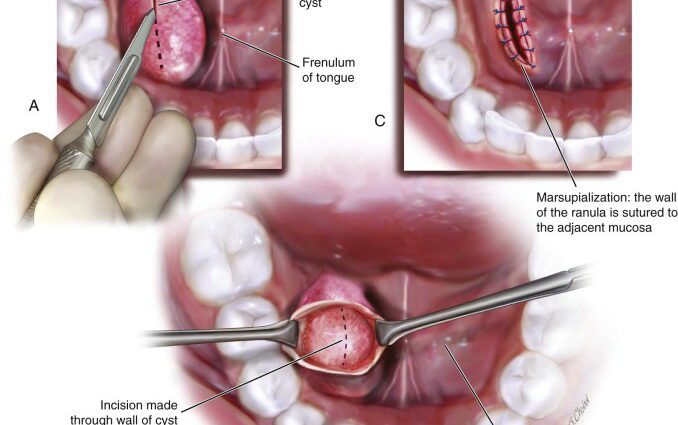Contents
Marsupialization: all about this operation
Marsupialization is a surgical technique used for the drainage of certain cysts or abscesses.
What is marsupialization?
To treat a cyst or an abscess, surgeons have several operating techniques that they choose to apply according to different criteria (superficial or deep lesion, infected or not). Marsupialization is one of them. It consists of incising the skin and then the pocket filled with liquid, emptying it of its contents (lymph, pus, etc.) and keeping it open to the outside. To do this, instead of realigning the two incised edges of the pocket, to close it, the edges are sutured with those of the skin incision. The cavity thus formed will gradually fill in and heal, without risking being the nest of a new infection.
Sometimes, when the cyst is located on a deep organ (kidney, liver, etc.), that it is not infected but only filled with a harmless liquid (lymph, for example), marsupialization is possible, not outward, but into the peritoneal cavity. The pouch is then sewn with the peritoneal sac. An intervention that can even be performed under laparoscopy, that is to say without having to open the abdomen.
Why do a marsupialization?
This technique is used in various situations:
- jaw cyst (in the upper jaw);
- pelvic lymphocele (accumulation of lymph in a cyst after kidney transplantation);
- neonatal dilation of the lacrimal sac (gland that produces tears);
- etc.
Its most frequent indication remains, however, the treatment of bartholinitis.
Bartholinitis treatment
Bartholinitis is an infectious inflammation of the Bartholin glands, also called the major vestibular glands. These glands are two in number. They are located on either side of the entrance to the vagina, where they contribute to lubrication during sexual intercourse. Due to a sexually transmitted infection (such as gonorrhea or chlamydia) or a digestive infection (especially Escherichia coli), one or both of these glands can become infected. This results in sharp pain and significant redness. A swelling or even a lump appears on the dorsal part of the labia majora: it may be a cyst or an abscess.
In first intention, the treatment of this pathology is based on antibiotic and anti-inflammatory drugs. If given quickly, these may be enough to fight the infection.
But if the infection is too severe, surgery should be considered. Excision, i.e. removal of the cyst, is the most invasive option: the risk of postoperative infection is higher, as is the risk of affecting the function of the gland or damage surrounding structures (blood vessels, etc.). It is therefore rather offered as a last resort, when the other options are not possible (for example in the face of a sclero-atrophic lesion, with mucous contents) or when it is a recurrence of bartholinitis.
Marsupialization is more conservative and easier to achieve. It is also not very hemorrhagic and less painful than excision.
How is this surgery performed?
The patient is installed in a gynecological position, with general or locoregional anesthesia. An incision of a few centimeters is made at the meatus of the gland’s excretion duct (located towards the back of the vaginal vestibule, i.e. the entrance to the vagina). The contents of the cyst or abscess are cleaned. Then the edges of the orifice thus created are sutured with those of the vestibular mucosa.
This device allows a large drainage of the abscess. Thanks to a directed healing (under medical supervision, but without graft or skin flap), the open wound will re-epithelialize itself gradually and spontaneously in a few weeks (approximately one month). The canal could even replenish itself naturally.
What results after this operation?
The primary goal of marsupialization treatment is to remove pain and inflammation. It allows, as far as possible, to preserve the gland and its function, therefore to avoid functional sequelae. Respect for anatomy could also explain the few recurrences of bartholinitis observed in patients operated on with this technique.
In particular, in the event of an infected cystic lesion, marsupialization offers the best guarantees in terms of immediate complications: infections and perioperative hemorrhages are rare.
What are the side effects?
As the wound artificially created by the surgeon is left open, there is little risk of a postoperative hematoma forming. A few cases of local infections have been described. But prescribing antibiotics before the procedure can limit this risk. On the other hand, recurrences are frequent.
It seems that the dyspareunies, that is to say the pain felt during sexual intercourse, linked to a reduction in vaginal lubrication, are rare.










